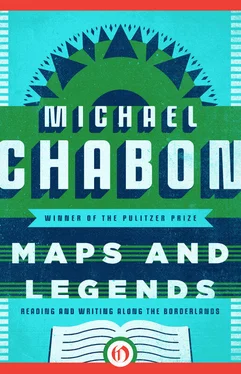In the meantime, I had begun to publish stories of my own, stories, in some cases, about fathers who disappointed their sons. The fathers in these stories were golem-fathers. I wove alphabetical spells around them, and breathed life into them, and they got up and walked out into the world and caused trouble and embarrassment for the small man of flesh and blood in whose image they had been cast. Or maybe it was I who was the golem, my father’s golem, animated by the enchantment of his narratives and lies, then rising up until I posed a danger to him and all the unlikely things that he, strangely enough, believed in.
Along the way I met a woman, and we decided to get married. She was not a Jew. To us — to the woman in question and me, I mean — this fact did not pose a problem. Of all the relatives of mine then living to whom it might have posed a problem, only the opinion of my grandfather mattered to me. But if he had any reservations about the match on religious grounds, he kept them to himself. Resistance, or at any rate a hint of misgiving, arose from an unexpected quarter: my father, perhaps the least observant self-identified Jew I’ve ever known, and believe me, that’s saying a lot.
He waited to voice his doubts, as has always been his wont in such matters, until the last possible moment, when it was for all practical purposes too late to do anything about them. On the night before the wedding, at the rehearsal dinner, which was held at a French restaurant on Lake Union (I was marrying a Seattleite), he took me aside. His approach was oblique. “You know, you’re a kohen,” he said, meaning a member, by tradition, of the hereditary caste of Jewish high priests, a distinction that supposedly dates back to our forty years spent refusing to stop for directions in the Sinai desert. By now, you can’t be too surprised to find my father including us among them. “Right,” I said. “Rabbi Judah.” “Oh, it goes back much farther than that,” he said, and I thought, We’re related to Moses himself. But instead of making the expected flight into the genealogical empyrean, my father’s face softened, and his eyes grew wistful, and he looked unaccountably sad. “All those generations of Jews marrying Jews,” he said. “Thousands and thousands of years of people like your mother and me.” “Yeah, well, you and Mom divorced,” I said. Oh, I was feeling very cocky. Then it was time for the toasts, and my father turned away from me. Three years from that day the Seattle girl and I would be divorced too.
After we had been married for about a month, and were living in Laguna Beach, a package arrived. In The Amazing Adventures of Kavalier & Clay I would employ the powers bestowed on me by Napoleon or my father and transform it into a crate, a massive wooden crate big enough to hold the huge clay man that I had seen them carrying out of Mr. Adler’s house that afternoon. In reality it was just a small parcel, about the size of a paperback book — about the size, come to think of it, of Strangely Enough! It was wrapped in brown paper, with a pasted-on label that seemed to have been typed on an old manual typewriter. There was no return address. When I opened it I found, wrapped in a wad of cotton battings — can you guess?
It was a small, rough tablet of clay, half as big as a credit card and three times as thick. The clay was dark and worn smooth at the corners. On one side you could make out the traces of some characters — Hebrew letters, I supposed — that had been cut into the surface with a stylus or pin.
At this point, after everything I’ve told you so far, I expect that you realize at once what the thing was, or what it purported to be. But at the time, years removed from Uncle Jack and Mr. Adler, from golems and my heritage real and imagined, I had no idea what it was supposed to be, only that holding it gave me a strange sense of uneasiness. My then wife and I were graduate students, and some of our friends were artists, and I figured that somebody was having a joke at my expense. My then wife walked in on me as I was staring at it, and before I could think about what I was doing, I threw the tablet into the trash, along with the junk mail and circulars from Thrifty Drug. For some reason I didn’t want her to see it.
About two years later, we had moved, trying to outrun the doom that was on us. We were living up in Puget Sound, on an island. It was a beautiful place, but I think I may have been, at the time, the only Jew living there; that, at any rate, was how I felt. One day when I drove into town to check our mailbox at the P.O., I found another small parcel awaiting me. It contained another small tablet. Actually, though I knew it was impossible, it seemed to be the same tablet, only this time the letters were so effaced as to be no more than scratches, nicks in the thing’s dusty surface. I had given no thought to that other mysterious gift since throwing it away in Laguna Beach, but I had been giving increasing thought — furtively, secretly, lying awake in the middle of the night with my goyish wife sleeping beside me — to my father’s words at the rehearsal dinner. The subject of children was beginning to come up, more and more insistently as my wife got older, and somehow, magically, every time it did we ended up having a painful, sticky, difficult argument — about religion! A subject I had never argued about with anybody in my life before! How can you tell me it’s important for our children to be Jewish, she would say with perfect justification, when it doesn’t seem to be at all important to you?
This time I recognized the tablet for what it was: a magic tablet for animating a golem, to be placed under its tongue by the hand of an adept. A reminder of Mr. Adler and his wishful lies, of the place where he claimed to have suffered. A reminder of all those who truly had died there, or at the next evil stop down the line. A reminder of all those generations of Jews, circling one another under the marriage canopy, intoning their spells, in order to bring into existence a golem, me, the embodiment of an ancient and simple wish: let there be more of us. Let us not disappear. I wondered who could have sent it — if perhaps old Mr. Adler was out there somewhere, busily forging magic tablets and keeping track of my whereabouts. Or perhaps the culprit was my father. In any case, this time — my heart, my conscience, my thoughts weighed down by the golem-heavy burden of memory — I put the thing in my pocket. I carried it there as the marriage dissolved. I was carrying it when I met my present wife, Ayelet, herself the product of generations of Jews marrying Jews and no doubt, though my father has never said anything about it, a third cousin three times removed.
Brother, you’re thinking. All this nattering on about golems and wishes and lies, and in the end the point comes down to one of your own kind, stick to your own kind. But that isn’t the point. I don’t know what the point is. All I know is that one sunny afternoon, not long after we met, I found myself in Jerusalem with Ayelet, at Yad Vashem, the Israeli national museum of the Shoah, or Holocaust, and my heart was broken. I came out into the sunshine and burst into tears and just stood there, crying, and the weight of the thing I carried, that tablet compounded of wishes and lies, that five-thousand-year burden of mothers and fathers and the wondrous, bitter story of their lives, almost knocked me down.
Our next stop before coming home was, of all places, Prague. Duly we made our way down to the ghetto, or what’s left of it, and trooped around the old Jewish cemetery, with its snaggled headstones lying like teeth in a jawbone. That’s where they buried old Rabbi Judah, and his grave is now a kind of pilgrimage site, strewn with memorial stones and penciled notes and withered flowers.
Читать дальше
Конец ознакомительного отрывка
Купить книгу












